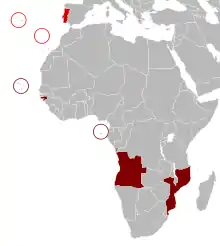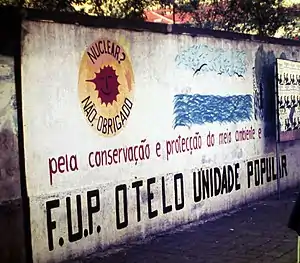Otelo Saraiva de Carvalho
Otelo Nuno Romão Saraiva de Carvalho, GCL (Portuguese pronunciation: [ɔˈtɛlu sɐˈɾajvɐ dɨ kɐɾˈvaʎu]; born 31 August 1936), is a retired Portuguese military officer. He was the chief strategist of the 1974 Carnation Revolution in Lisbon. After the Revolution, Otelo assumed leadership roles in the first Portuguese Provisional Governments, alongside Vasco Gonçalves and Francisco da Costa Gomes, and as the head of military defense force COPCON. In 1976, Otelo ran in the first Portuguese presidential election, in which he placed second with the base of his support coming from the far-left. In the 1980s Otelo was accused of having involvement with the controversial Forças Populares 25 de Abril.
Otelo Saraiva de Carvalho | |
|---|---|
 Otelo Saraiva de Carvalho in 1976 | |
| Nickname(s) | Otelo |
| Born | 31 August 1936 Lourenço Marques, Portuguese Mozambique |
| Allegiance | |
| Service/ | |
| Years of service | 1955–1984 |
| Rank | Colonel |
| Battles/wars | Portuguese Colonial War Carnation Revolution |
| Awards | Grand Cross of the Order of Liberty |
| Other work | Candidate to President of Portugal |
Early life
Otelo Saraiva de Carvalho was born in Lourenço Marques, Portuguese Mozambique (now Maputo, Mozambique) on 31 August 1936, of Luso-Goan (Portuguese India) ancestry. Named by his theater-minded parents after Shakespeare's Othello, he completed his secondary education at a state school in Lourenço Marques. His father was a civil servant and his mother a railway clerk. He entered the Military Academy in Lisbon in 1955, at the age of nineteen.[1]
.jpg.webp)
Otelo spent many years in the colonial wars in Africa. He served in Portuguese Angola from 1961 to 1963 as a second lieutenant, and as a captain from 1965 to 1967. He was posted to Portuguese Guinea in 1970 as a captain, under General António de Spínola, in charge of civilian affairs and the propaganda campaign Hearts and Minds.[1]
On 5 November 1960, he married Maria Dina Afonso Alambre with whom he has had two daughters and a son.[1]
In 1970, Otelo attended the funeral of former Portuguese Prime Minister, António de Oliveira Salazar. At the funeral, Otelo was seen weeping over the casket of Salazar.[2]
Carnation Revolution and PREC

Otelo joined the underground Movement of Armed Forces (Movimento das Forças Armadas - MFA), which carried out a coup d'état in Lisbon on 25 April 1974, in which he played a directing role.[3]
In July 1974, Otelo was made a brigadier and placed in command of the special military Command for the Continent COPCON, which was set up to secure order in the country and to promote the revolutionary process. In 1975, infighting in the MFA intensified with Otelo representing the left-wing of the movement. A right-wing putsch attempt, led by António de Spínola, was thwarted by the timely intervention of COPCON in March 1975. He became part of the Council of the Revolution which was created on 14 March 1975. In May 1975 he was temporarily promoted to General and, together with Francisco da Costa Gomes and Vasco Gonçalves, formed the Directório (Directorate).[4]
In July 1975, Otelo visited Cuba with a delegation of Portuguese military officers to meet Fidel Castro.[5] Otelo participated in the Cuban 26 of July celebrations with Castro.[6] During this trip, Castro informed Carvalho of his intention to send Cuban troops to Angola, to which Otelo assured Castro that the Portuguese government would have no objection to the involvement of Cuba in Portuguese Angola.[7]
On 25 November 1975, a military radical left-wing coup was attempted, made up of members of the MFA, the Portuguese Army Commandos, and COPCON under the leadership of Otelo. The coup, orchestrated by Otelo, failed to take control of the Portuguese government. As a result of the coup, Otelo was imprisoned, COPCON was disbanded, and António Ramalho Eanes rose to power. As punishment for participation in the coup, Otelo was imprisoned for three months.[8][9]
In 1976, Otelo unsuccessfully stood as a candidate for president against Eanes.[10] Throughout his campaign, Otelo campaigned on a platform promoting socialism, national independence, and popular power.[11] Otelo's support came from the Portuguese working class, specifically in Setúbal and Alentejo. A notable supporter and organizer of Otelo's campaign was Zeca Afonso, a popular Portuguese revolutionary songwriter.[12] Otelo finished second in the election, with 792,760 votes (16.46%).[10]
1980 Presidential Campaign

In 1980, Otelo was a candidate in the Portuguese presidential elections. Otelo was nominated for the presidency by the far-left political party he founded, the Força de Unidade Popular (FUP). Otelo's campaign was centered on building socialism in Portugal.[13] Once again, Otelo received support and advice from Portuguese musician Jose Afonso throughout the campaign.[12] Otelo finished third in the elections with 85,896 votes (1.4%).[14] After the election, Otelo confessed that he voted for his rival Eanes in the election, "to avoid the victory of the right-wing candidate Soares Carneiro".[12]
Terrorism allegations and Imprisonment
In 1982 he was recalled to the army, since it was shown that his discharge had been politically motivated. In 1984 he was arrested and accused of contact with or membership of the terrorist group Popular Forces 25 April (FP-25), a group responsible for a number of robberies and murders in Portugal. His trial was controversial and his allies assumed it to be motivated by revenge. In 1985, he was tried, convicted, and demoted to Lieutenant-colonel for his role in FP-25.[1]
While imprisoned for his involvement with FP-25, Otelo met Maria Filomena Morais and began a bigamous relationship with her and his first wife Maria Dina Afonso Alambre.[1][15]
In 1989, Otelo received amnesty for his participation in FP-25 due to the legal imbroglio related to his case.[16]
Later life
Otelo retired from military service and public life in 1989.[16]
Since retiring, Otelo has remained a political activist within his party, Força de Unidade Popular, and Otelo has been featured in multiple documentaries about the Carnation Revolution.
In 2011, during the Portuguese financial crisis when the country was at the end of the Left-wing government of José Socrates and had to request international financial assistance, Otelo Saraiva de Carvalho stated that he wouldn't have made the revolution if he had known what the country would become after it.[17] He also stated that the country would need a man as honest as Salazar to deal with the crisis, but from a non-fascist perspective.[18]
Influence
Otelo is still an icon for activists of the left in Portugal, but is hated by many right-wingers who consider him a terrorist who tried to seize power in the country in order to become Portugal's Fidel Castro.[19]
In 2006, Otelo was voted the 68th greatest Portuguese in the Os Grandes Portugueses competition.[20]
Election results
Presidential Elections of 27 June 1976
Summary of the 1976 Portuguese presidential election election results
| Candidates | Supporting parties | First round | ||
|---|---|---|---|---|
| Votes | % | |||
| António Ramalho Eanes | Independent | 2,967,137 | 61.59 | |
| Otelo Saraiva de Carvalho | Independent | 792,760 | 16.46 | |
| José Pinheiro de Azevedo | Independent | 692,147 | 14.37 | |
| Octávio Rodrigues Pato | Portuguese Communist Party | 365,586 | 7.59 | |
| Total valid | 4,817,630 | 100.00 | ||
| Blank ballots | 43,242 | 0.89 | ||
| Invalid ballots | 20,253 | 0.41 | ||
| Total (turnout 75.47%) | 4,881,125 | |||
| Source: Comissão Nacional de Eleições | ||||
Presidential Elections of 7 December 1980
Summary of the 1980 Portuguese presidential election election results
| Candidates | Supporting parties | First round | ||
|---|---|---|---|---|
| Votes | % | |||
| António Ramalho Eanes | Independent | 3,262,520 | 56.44 | |
| António Soares Carneiro | Democratic Alliance | 2,325,481 | 40.23 | |
| Otelo Saraiva de Carvalho | Força de Unidade Popular | 85,896 | 1.49 | |
| Carlos Galvão de Melo | Independent | 48,468 | 0.84 | |
| António Pires Veloso | Independent | 45,132 | 0.78 | |
| António Aires Rodrigues | Workers Party of Socialist Unity | 12,745 | 0.22 | |
| Carlos Brito | Portuguese Communist Party | left the race | ||
| Total valid | 5,780,242 | 100.00 | ||
| Blank ballots | 44,014 | 0.75 | ||
| Invalid ballots | 16,076 | 0.28 | ||
| Total (turnout 84.39%) | 5,840,332 | |||
| Source: Comissão Nacional de Eleições | ||||
Publications
- Cinco meses mudaram Portugal (1975)
- Contribuiçāo para uma alternativa popular à crise da economia em Portugal: texto de apoio da candidatura à Presidência da República de Otelo Saraiva de Carvalho (1976)
- Otelo: o povo é quem mais ordena (1977)
- Memorias de abril (1978)
- Alvorada em abril (1984)
References
- Moura, Paulo. Otelo: o Revolucionário. Dom Quixote, 2012.
- "Portugal: a Twentieth-Century Interpretation." Portugal: a Twentieth-Century Interpretation, by Tom Gallagher, Manchester University Press, 1983, p. 200.
- "Biografia de Otelo Saraiva de Carvalho". RTP Archives. Retrieved 28 January 2018.
- Kaplan, Jim; Zeitlin, Jon (17 September 1975). "The Real Threat in Portugal". Harvard. Harvard Crimson. Retrieved 25 January 2018.
- Anderson, Jack. "Portugal: The Cuban Connection" (PDF). Central Intelligence Agency. Retrieved 22 January 2018.
- Castro, Fidel. "discurso pronunciado por el comandante en jefe fidel castro ruz, primer secretario del comite central del partido comunista de cuba y primer ministro del gobierno revolucionario, en el acto central en conmemoracion del xxii aniversario del ataque al cuartel moncada, efectuado en la ciudad de santa clara, las villas, el 26 de julio de 1975, "año del primer congreso"". Cuban Government. Retrieved 22 January 2018.
- "Acordos de Alvor Cubanos em Angola Rosa Coutinho Otelo Saraiva de Carvalho Almerindo Jaka Jamba". YouTube. Retrieved 22 January 2018.
- Tannock, Michael. "13th Period - Third Republic of Portugal (20th and 21st Century)". Portugal History. Portugal History. Retrieved 26 January 2018.
- Faye, Jean Pierre. Portugal: the Revolution in the Labyrinth: from the Papers of the Russell Committee for Portugal. Spokesman Books, 1976. pg. 43
- "CNE Resultados". Comissão Nacional de Eleições. Retrieved 25 January 2018.
- "Scenes from the Class Struggle in Portugal = Cenas Da Luta De Classes Em Portugal." New York Cinema Co., 1976.
- "José Afonso. Foi Otelo quem escolheu o músico para "cantar" senha do 25 de Abril". Observador. Observador. Retrieved 1 February 2018.
- Constitutional Tribunal of Portugal (14 May 1987). "ACÓRDÃO N.º 231/04" (in Portuguese). Retrieved 1 February 2018.
- "CNE Resultados". Comissão Nacional de Eleições. Retrieved 25 January 2018.
- "Otelo e as suas duas mulheres". Correio de Manhã. Correio de Manhã. Retrieved 1 February 2018.
- Otelo. "FP-25 foram "choque grande e um prejuízo total"". Retrieved 26 January 2018.
- (in Portuguese) «Se soubesse como o País ia ficar, não fazia a revolução», Destak.pt (13 April 2011)
- (in Portuguese) <<Otelo: precisamos de um homem honesto como Salazar>>, in Diário de Notícias (21 April 2011)
- (in Portuguese) O 'mistério' do 25 de Novembro de 1975, José Manuel Barroso, in Diário de Notícias (21 November 2006)
- "Grandes Portugueses". RTP. RTP. 2006. Retrieved 1 February 2018.
